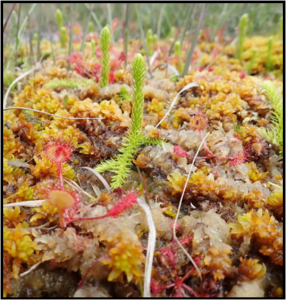Leave no Trace – how we can all protect the New Forest’s freshwater wildlife
5th July 2022
The New Forest’s wetland wildlife depends on clean unpolluted water. Our Leave no Trace campaign helps you to take positive steps to protect the Forest’s internationally important wetlands and freshwater habitats.
The New Forest has become a popular destination over the years, particularly with the increase of UK-based holidays during the pandemic. A trip here, whether for the day or a holiday retreat, is worth planning well to ensure that your visit minimises impact. The fragile nature of the Forest means that our activities should remain tranquil and thoughtful and leaving no trace is the golden rule.
Through our Leave no Trace campaign, we’re highlighting the ways you can help to protect the New Forest’s wildlife and habitats.
An incredible array of plants and animals
Plants have adapted over thousands of years within soils that are naturally low in nutrients. The New Forest still boasts areas of these ancient soils, which host an incredible array of wildlife biodiversity, now lost from many other places in the UK.
Unlike other landscapes, the New Forest is famous for the free roaming grazing livestock, especially the ponies and the cows. These animals play an important role in providing the perfect conditions for rare and endangered plants to exist. The depressions created from the movement of these animals, the particular way they graze and even the organic dung the ponies and cows produce are all-important ingredients for laying the foundations for a thriving ecosystem of wildlife large and small.
Clean unpolluted water is also key to the plant and animal communities that exist in the Forest. There are still areas at the core of the Forest where freshwater is not impacted by pollution. These freshwater habitats are some of the best in Europe and deserve the very best protection and recognition.

The importance of water quality
As a freshwater conservation charity, water quality is at the top of our agenda. Over the years, we have seen species disappear due to human influence, which has changed water quality for the worse. Thinking ahead about your visit means, you can plan for a toilet stop, know where the nearest bin is for pet waste (which is harmful to soil and water) and litter, and remembering that BBQs and fires are banned in the National Park. All these activities cause harm and endanger wildlife that is dependent on a clean unpolluted environment.
Leave no Trace
Wild spaces are a tonic for our body and mind. Studies reveal the incredible benefits of spending time in the natural environment. Increasing our wellbeing and keeping us healthy is just one benefit nature provides. Ensuring we don’t leave a scar on the landscape will keep the Forest in its natural state and will continue to be a living, breathing ecosystem, supporting biodiverse wildlife communities, storing carbon, contributing to clean air and water and a space where people can visit and be in harmony with the natural surroundings.
The next time you visits the Forest, plan ahead, leave nothing behind and take nothing away except for a love of the Forest.
Thinking ahead – top tips for a day visit:
- Did you know there is a dedicated website called Pee Place that provides an interactive map for your convenience?
- You can also find locations of waste bins, thanks to an interactive map produced by the New Forest District Council. Click on the three lines in the top left corner, go to Map Features and choose Waste and Recycling. You can also find play areas, skate parks and leisure centres under Leisure.
- Many visitors come to the Forest in a camper or motor home. Always use suitable facilities for the disposal of waste water. Never tip washing up water, toilet waste or even tap/drinking water onto vegetation or into ditches – this is pollution and will cause harm to wildlife.
- If staying overnight, plan a great camping trip at a New Forest Campsites. Wild camping and overnight parking are not permitted.
Through our project, Wilder for Water, we work with visitors, organisations and businesses to raise awareness of the special qualities of the New Forest waterscape and to champion a best practice ‘clean water standard’ for camping and recreation.
